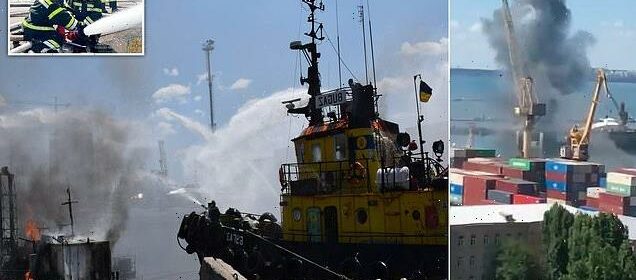Russia insists airstrike on Odesa did not hit grain facilities

Russia insists airstrike on Odesa destroyed only Ukrainian military targets in ‘high precision’ strike and not grain facilities – as the two countries agreed a deal to lift Putin’s blockade
- Long-range Russian missiles destroyed a Ukrainian warship and weapons cache
- But Moscow agreed not to target ships or port facilities where grain is exported
- Russia and Ukraine on Friday signed agreements with the UN and Turkey in Istanbul aimed at clearing the way for the shipment of millions of tons of grain
- Ukraine could export 60 million tonnes of grain over the next nine months
- But a presidential advisor said this could take 24 months if ports are damaged
Russian defence officials insisted today that an airstrike on the Ukrainian port of Odesa on Saturday hit only military targets, but the attack tested an agreement on resuming grain shipments that the two countries signed less than a day before the assault.
Long-range missiles destroyed a docked Ukrainian warship and a warehouse holding Harpoon anti-ship missiles supplied by the U.S., defence ministry spokesman Igor Konashenkov said at a daily briefing.
Speaking late Saturday in his nightly televised address, Ukrainian President Volodymyr Zelensky said the attack on Odesa ‘destroyed the very possibility’ of dialogue with Russia.
Under the grain-shipment agreement signed earlier this week in Turkey, both Kyiv and Moscow agreed not to target vessels and port facilities involved in the initiative, including the ports of Odesa, Chernomorsk and Yuzhny.
The Ukrainian military said the attack involved four cruise missiles – two of which were shot down by Ukrainian air defences – and confirmed the port’s grain storage area was not hit.
‘We continue technical preparations for the launch of exports of agricultural products from our ports,’ Ukraine’s Infrastructure Minister Oleksandr Kubrakov said in a Facebook post.
But further attacks in and around the port would undoubtedly disrupt operations and fly in the face of the breakthrough agreement signed only days ago.
Zelensky’s economic advisor warned on Sunday the strike on Odesa signalled that diplomacy is unlikely to bring about any resolution in the conflict with Russia.
‘Yesterday’s strike indicates that it will definitely not work like that,’ Oleh Ustenko told Ukrainian television.
He said Ukraine could export 60 million tonnes of grain over the next nine months, but it would take up to 24 months if its ports’ operations were disrupted.
In this photo provided by the Odesa City Hall Press Office, firefighters put out a fire in a port after a Russian missiles attack in Odesa, Ukraine, Saturday, June 5, 2022. (Odesa City Hall Press Office via AP)
This image shows the immediate aftermath of the Russian airstrike on the port of Odesa yesterday
Firefighters work to put out a fire caused by a missile attack in Odesa as Russia’s invasion of Ukraine continues, July 23, 2022
Turkish President Recep Tayyip Erdogan, right, and U.N. Secretary General, Antonio Guterres, left sit as Russian defence minister Sergei Shoigu shakes hands with Turkish Defence Minister Hulusi Akar at Dolmabahce Palace in Istanbul, Turkey, upon signing of the grain protection deal on Friday
Russia and Ukraine on Friday signed identical agreements with the United Nations and Turkey in Istanbul aimed at clearing the way for the shipment of millions of tons of desperately needed Ukrainian grain, as well as the export of Russian grain and fertilizer.
Senior U.N. officials voiced hopes that the deal would end a months-long standoff that threatened food security around the globe.
Yesterday’s strikes on Odesa drew condemnation from the United Nations, the European Union, the United States, Britain, Germany and Italy, but Turkey’s defence minister said Russian officials told Ankara that Moscow had ‘nothing to do’ with the strikes.
As the war entered its sixth month on Sunday, Ukrainian authorities reported that Russian shelling continued to kill and wound civilians in Ukraine’s south and east.
The governor of the eastern Donetsk region, one of two that make up Ukraine’s industrial heartland of the Donbas and a key focus of Russia’s offensive, said two civilians had been killed and two more wounded over the previous 24 hours.
British military reported Sunday in its daily intelligence update that Russia was making ‘minimal progress’ in its Donbas offensive, which it said remained small-scale and focused on the city of Bakhmut in the eastern Donetsk region.
The Ukrainian military’s General Staff confirmed in its regular update that Russia was ‘conducting military operations to create conditions’ for an assault on Bakhmut, while firing on surrounding settlements and battling Ukrainian defenders for control of a nearby thermal plant.
In Ukraine’s south, regional officials said that at least five civilians were wounded by Russian shells in the Black Sea port of Mykolaiv (pictured) on Saturday night
A structure in Mykolaiv is completely destroyed in a Russian missile attack
Firefighters are seen dousing a house following shelling in the Mykolaiv region
In Ukraine’s south, regional officials said that at least five civilians were wounded by Russian shells in the Black Sea port of Mykolaiv on Saturday night and Sunday morning.
‘Also, as a result of the scattering of munitions and their fragments, fires occurred in open areas in the city,’ said Vitaly Kim, governor of the Mykolaiv region.
Russian Foreign Minister Sergey Lavrov meanwhile was in Cairo on Sunday for talks with Egyptian officials as his country seeks to break diplomatic isolation and sanctions by the West over its invasion of Ukraine.
Lavrov landed in Cairo late Saturday on the first leg of his Africa trip, which will also include stops in Ethiopia, Uganda and Congo, according to Russia’s state-run RT television network.
Speaking at a news conference following bilateral talks with his Egyptian counterpart, Sameh Shukri, on Sunday, Lavrov said that he had ‘reaffirmed the commitment of Russian grain exporters to fulfill all their obligations’ in the wake of the U.N.-backed deal to unblock grain shipments.
Source: Read Full Article






